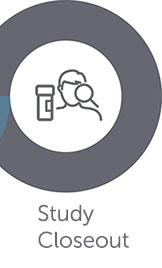Study Conduct | Overview
 |
 |
 |
 |
 |

While patient enrollment and data capture are underway the trial must be continuously evaluated.
Launch study
Thoroughly planning for study launch, and screening and enrollment strategies can help bolster accrual.
| Set date for trial launch | Establishing a date for trial launch imposes a tentative deadline that all members of the study team are working towards and often proves useful. The date can always be adjusted. |
| Post study on ClinicalTrials.gov | ClinicalTrials.gov is a web-based resource that provides patients, their family members, health care professionals, researchers and the public with easy access to information on publicly and privately supported clinical studies for a wide range of diseases and conditions. Information on ClinicalTrials.gov is provided and updated by the sponsor or principal investigator of the clinical study. Studies are generally submitted (registered) on the website when they begin, and the study information on the site is updated throughout the study. Learn more about Boston Children's ClinicalTrials.gov policy [internal link]. |
| Engage colleagues and members of the clinical team | Briefing departmental faculty, colleagues and members of the multidisciplinary team about an upcoming study can engage co-workers in the identification of potential study subjects and their support for the study. Research nurses and study coordinators frequently prepare and deliver study-related education to staff in the clinical environment to ensure they are aware of study requirements and how they can assist. |
| Inventory investigational product | Conferring with the investigational pharmacist early in the planning for a therapeutic study is very important. The study team is responsible for ensuring that the investigational agent is available in the Investigational Pharmacy and that the pharmacist has no final questions or issues that need to be resolved prior to study initiation. Maintenance of an adequate inventory of study drug in the pharmacy is also a study team responsibility. |
| Develop resource manual for clinical unit (if subjects are on inpatient units) | Developing a study resource manual for clinical staff, who will be caring for participants, is important if subjects are inpatients during the study. Working with the clinical unit educator regarding how to best communicate this information to bedside caregivers and where the manual will be housed on the unit is an important responsibility of the study coordinator or research nurse. A one-page summary of relevant study information (study Fact Sheet) for direct care giving staff can help ensure protocol compliance. Unit staff can designate the best place to locate this information for use by the clinical team. |
| System for screening and enrolling subjects | Clinical trials can fail for many reasons. One common reason is missing the opportunity to approach potential study subjects, due to a less-than-comprehensive system for screening and identifying potentially eligible subjects. As part of the Manual of Operations, a detailed screening process that will identify potential study subjects is extremely important as is a process to carefully review inclusion/exclusion criteria prior to approaching potential subjects for study enrollment. |
| Study implementation meeting(s) | As the time approaches to launch a research study, it is important to schedule at least one meeting that includes the investigator, study team and members of ancillary services, e.g. Investigational Pharmacy staff and nursing unit representatives that will be involved with study visits. This meeting can be used to answer questions and clarify roles in an effort to ensure that all personnel involved in the study are prepared. |
Screening and enrolling study subjects
| Develop study recruitment plan | Part of developing a recruitment plan is realistically estimating recruitment potential. Estimating subject recruitment should take into account the complexity of the study visits/procedures, inclusion/exclusion criteria, previous experience with the target population, expected screen failures and dropouts, referral, seasonal and other factors that may affect recruitment. It may be helpful to work with a biostatistician to estimate the number of subjects that will need to be screened to achieve the expected enrollment target. This number helps to develop a timeline for screening per week or month. View the recruitment plans guideline [internal link]. |
| Seek permission to approach potential subjects | Prior to approaching a potential study subject, a careful review of the exclusion/inclusion criteria should be completed. Conferring with the clinical team caring for a potential participant, prior to approaching the child and family, can help to ensure there is no interruption in clinical care or potential issues that would make approaching the family for consent inappropriate. |
| Document completed informed consent | The Consent Library in CHeRP contains the most up-to-date consent/assent forms. Informed consent must be documented on a written consent form approved by the IRB and signed by the subject or the subject's legally authorized representative. A copy is to be given to the subject or parent, or legal guardian of the subject. A copy of the signed consent form is to be placed in the medical record (unless otherwise approved by the IRB), if the study involves medical interventions, to ensure the safety of patients who participate in research. Informed consent must be obtained before the initiation of any screening or study procedures. |
| Reconcile in EPIC study charges following study visits | The Clinical Trials Business Office (CTBO) works with study staff to create in EPIC a way to ensure that research visits/components are billed to a study account and not billed to a patient’s insurance. The study team is responsible for contacting and working with the CTBO to build the study-specific charges in EPIC and secure the required training to reconcile charges at the completion of study visits. After review and approval by the PI and the CTBO, the study coordinator should ensure that the CTBO notifies the IRB and notifies Patient Financial Services (PFS DL) so that the study coordinator can put the protocol, PI, fund number, etc. into EPIC. |
| Review the IRB policy titled: "Unanticipated Problems Involving Risks to Research Subjects and Others Including Adverse Events" |
Federal regulations 45 CFR 46.103(b)(5)(i) and 21 CFR 56.108(b)(1) require IRBs to have written procedures for ensuring prompt reporting to the IRB, appropriate institutional officials, and the federal department or agency head of any unanticipated problems involving risks to subjects or others. In keeping with this regulatory requirement, investigators must promptly report to the IRB unanticipated problems involving risks to subjects or others including serious and unexpected events that are related or possibly related to study participation as well as other events that meet criteria specified by the IRB. |
Data collection
| Collection of participant data |
Data collection encompasses the gathering of a wide range of a study and may occur at many time points throughout the research study. Collecting data may begin with pre-screening and recruitment and continue through trial termination. Accurately dating and timing study tests and samples is extremely important when conducting clinical research. |
| Assess adverse events | It is the responsibility of the PI and licensed clinicians on the study team to monitor study subjects for adverse events during an interventional trial. The IRB, FDA, DSMB and sponsor are each likely to have unique reporting requirements. It is the Investigator’s responsibility to understand and comply with these requirements. |
Clinical trial oversight
Participants enrolled on clinical trials must receive the same high-quality care found elsewhere throughout Boston Children's Hospital. Communication and coordination between the research team and the clinical care team improves study compliance and supports patient safety. While patient enrollment and data capture are underway the trial must be continuously evaluated.
| Study team meetings and communication | Updating research staff or caregivers for subjects enrolled in your study is courteous and helps to keep staff engaged and supportive of your research. A regular meeting ensures time for the study team to plan, bring forward study questions, work through logistical issues, data review, etc. The study coordinator or research nurse typically prepares the agenda with the PI and takes the meeting minutes and distributes them to the study team members. Communicating with the statistician as the study approaches target enrollment is critical in preparing for data analysis. Regular review of data can identify deviations and potential workflow improvements. |
| Study monitoring for sponsor-investigators | The purpose of monitoring is to ensure adequate protection of the rights of human subjects, the safety of all subjects and the integrity of the resulting data submitted to the FDA. Throughout the trial, study monitoring provides for continued training and education of the study staff; reviews the progress of the study and verifies that data collected is accurate. |
| Amendments | Throughout the lifespan of a clinical trial, there are likely to be amendments to the protocol. It is important to ensure that the most current copy of the protocol is available in the clinical area where study subjects may be cared for, should a staff member need to refer to the protocol. Amendments may result in changes to the Informed Consent document, the Manual of Operations, study orders and the resource manual for the clinical unit. |
Report trial progress
Actively planning your study launch and screening and enrollment strategies can help bolster accrual.
| Annual IRB report | In accordance with current federal regulations, the IRB must review the risk/benefit ratio for protocols at least annually. The IRB will contact you when it is time for your annual review. |
| IND annual report | IND application sponsors are expected to submit brief reports of the progress of the investigations conducted under their respective IND application within 60 days of the anniversary date that the application went into effect. These reports are submitted annually. View the IND annual report template. |
| ClinicalTrials.gov | ClinicalTrials.gov is a Web-based resource that provides patients, their family members, health care professionals, researchers, and the public with easy access to information on publicly and privately supported clinical studies on a wide range of diseases and conditions. The website is maintained by the National Library of Medicine (NLM) at the National Institutes of Health (NIH). Information on ClinicalTrials.gov is provided and updated by the sponsor or principal investigator of the clinical study. Studies are generally submitted (registered) on the website when they begin, and the study information on the site is updated throughout the study. Learn more about the Boston Children's ClinicalTrials.gov policy [internal link] and helpful links [internal link]. |
